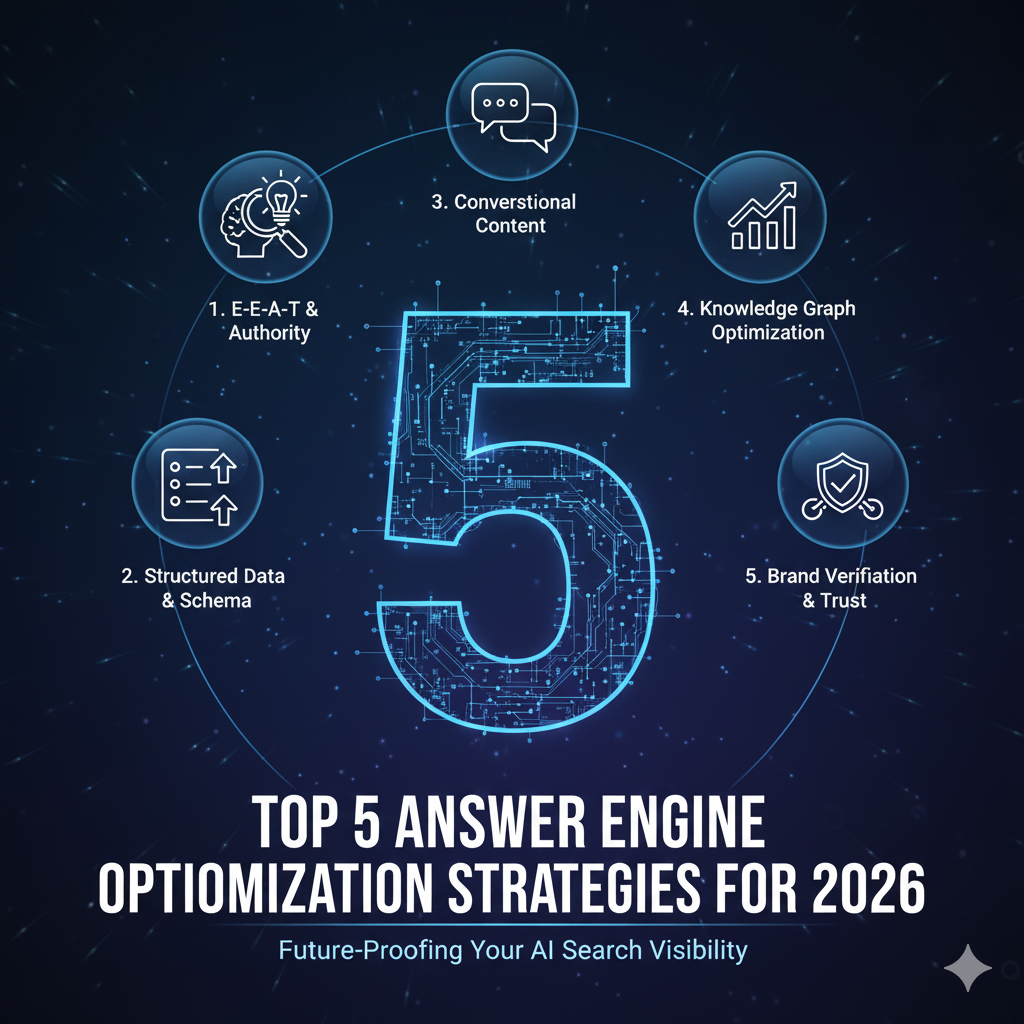TL;DR: As AI search reshapes SEO, mastering Answer Engine Optimization (AEO) is crucial for 2026. Focus on conversational content, structured data, entity recognition, and user intent to ensure your business provides definitive answers and secures top spots in AI-driven search results.
You’ve navigated the evolving landscape of search, understanding that traditional SEO alone isn’t enough. Now, as we look towards 2026, the rise of AI-powered search engines and conversational interfaces demands a more sophisticated approach. You’re ready to make a confident decision about how to best position your brand in this new era. This isn’t about guessing; it’s about implementing proven answer engine optimization strategies that deliver tangible results. Let’s dive into the top 5 initiatives that will help you outrank competitors in 2026 and solidify your presence in AI search.
1. Embrace Conversational Content for Direct Answers
The core of AEO is providing direct, concise answers to user queries. AI search engines are designed to understand natural language and deliver information conversationally. This means your content needs to mirror that style. Instead of lengthy, jargon-filled articles, focus on creating content that directly addresses specific questions users might ask.
Think about how you’d explain a complex topic to a friend. Use clear, everyday language. Structure your content with question-and-answer formats, defining key terms and providing context. This approach not only satisfies user intent but also makes it easier for AI to extract and present your content as a definitive answer.
For example, if you offer project management software, instead of a generic article on “Project Management Benefits,” create content titled “How Can Project Management Software Improve Team Collaboration?” and provide a clear, bulleted list of benefits directly addressing the “how.” This focus on direct answers is a fundamental seo answer engine optimization tactic.
2. Master Structured Data and Schema Markup
Structured data acts as a translator between your content and AI search algorithms. By implementing schema markup, you provide explicit context about the information on your pages. This helps AI understand entities, relationships, and the specific purpose of your content, making it more likely to be selected for featured snippets, answer boxes, or direct AI responses.
Focus on relevant schema types for your industry. For SaaS companies, this could include `SoftwareApplication` schema to detail features, pricing, and compatibility. For content-focused businesses, `FAQPage` schema is invaluable for clearly marking question-and-answer pairs. The more precisely you define your content’s structure and meaning using schema, the better AI can interpret and serve it.
Implementing `Organization` and `Product` schema also helps AI build a comprehensive understanding of your brand and offerings, crucial for accurate entity recognition. These structured data elements are foundational generative engine optimization techniques that boost visibility.
3. Prioritize Entity Recognition and Knowledge Graphs
AI search doesn’t just look at keywords; it understands entities – real-world objects like people, places, organizations, and concepts. Building your brand’s presence within AI knowledge graphs is a critical answer engine optimization strategy for 2026. This involves ensuring your brand, products, and key personnel are consistently and accurately represented across the web.
How do you achieve this? Create authoritative content that clearly defines your brand’s unique value proposition and its position within your industry. Link to and from reputable sources. Use consistent naming conventions across all platforms. The goal is to become a recognized and trusted entity in the eyes of AI.
For instance, if your SaaS company is a leader in “customer relationship management,” ensure your website, social profiles, and any third-party mentions clearly establish this connection. This signals to AI that you are a definitive source for CRM-related information.
4. Optimize for User Intent and Conversational Queries
AI excels at understanding the nuances of human language, including intent behind conversational queries. Your aeo hacks must align with this by anticipating the questions users will ask and providing the most relevant, helpful answers. This goes beyond traditional keyword research .
Analyze search queries that are phrased as questions. Look at “People Also Ask” sections on Google, forum discussions, and customer support logs to identify common inquiries. Then, craft content that directly answers these questions, providing comprehensive yet concise information. This user-centric approach ensures you’re meeting users precisely where they are in their search journey.
Consider the different stages of intent : informational (“What is AEO?”), navigational (“[Your Brand] login”), and transactional (“Buy [Your Product]”). AI search is particularly adept at serving informational and transactional needs directly, so tailor your content to cover all bases.
5. Leverage AI-Powered Analytics for Continuous Improvement
Staying ahead in 2026 means embracing tools that help you understand and adapt to AI search behaviors. AI-powered analytics platforms can provide deeper insights into how users are interacting with your content, what questions they’re asking, and where AI is pulling information from. This data is invaluable for refining your top 5 answer engine optimization strategies .
Look for tools that can track AI-driven traffic, analyze conversational query patterns, and identify opportunities for new content or optimizations. Understanding these trends allows you to proactively adjust your saas seo strategy and ensure your content remains relevant and authoritative.
By continuously monitoring performance through an AI lens, you can identify which answer engine optimization tactics are yielding the best results and iterate accordingly. This data-driven approach is key to maintaining a competitive edge and ensuring your content is always optimized for AI search.
Frequently Asked Questions
Implementing these top 5 answer engine optimization strategies requires a shift in perspective, moving from page rankings to direct answer provision. By focusing on conversational clarity, structured data, entity authority, and user intent, you’re not just adapting to the future of search; you’re actively shaping it for your business.
Schedule Your AEO Strategy Consultation
Additional Related URLs for reference:
10 Common AEO Mistakes and How to Avoid Them
AI Answer Engine Optimization Tool
Top 5 AI-Powered SEO Tools
